Hi there, pet lovers! 🦎
Today, we’re diving into the captivating world of Monkey Anoles, an enchanting lizard species adored by reptile enthusiasts for their unique appearance and intriguing behavior. But are they the right pet for you? Let’s explore every aspect of keeping these fascinating creatures in our signature style, covering everything from ease of handling to costs.
Overview
Monkey Anoles (Polychrus gutturosus) are fascinating, arboreal lizards native to the tropical rainforests of South America. Known for their vibrant colors, chameleon-like appearance, and acrobatic climbing skills, these lizards are a unique addition to the world of reptile pets. However, they are not for everyone. Monkey Anoles require specific care, a well-maintained habitat, and a commitment to understanding their unique needs.
Here’s a quick summary of what makes them stand out:
- Handling and Temperament: Generally skittish and not suited for frequent handling.
- Care and Maintenance: Moderate to high maintenance, requiring specific humidity, temperature, and habitat setups.
- Health and Durability: Sensitive to environmental changes and prone to stress-related health issues.
- Availability: Not widely available; best sourced from specialty breeders or reptile expos.
- Cost: Moderate initial setup costs with ongoing expenses for live food and habitat maintenance.
- Overall: A unique and rewarding pet for experienced reptile enthusiasts who enjoy observing rather than handling their pets.
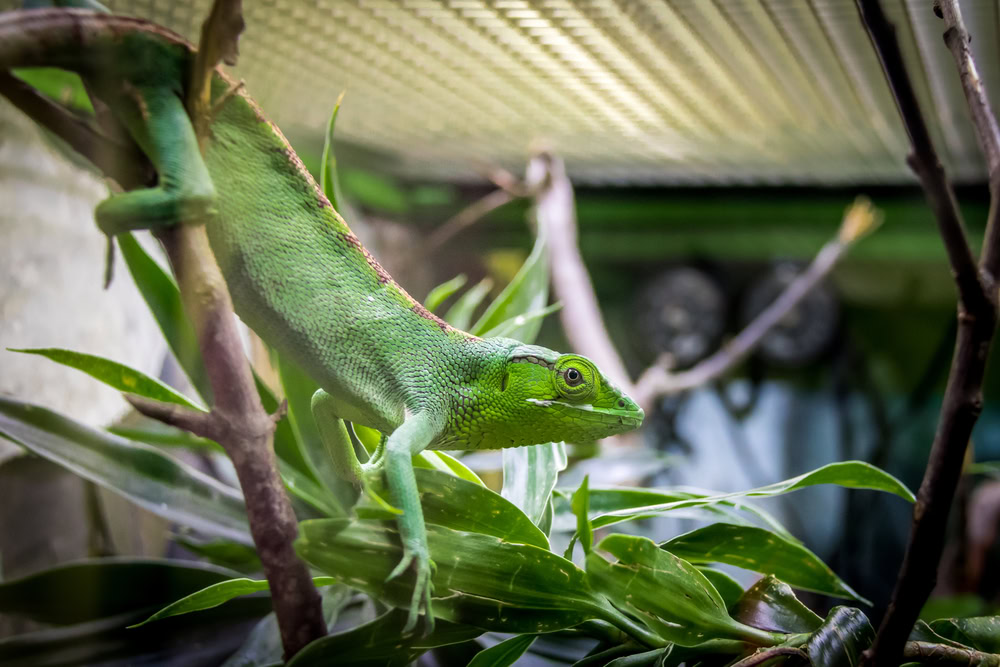
Why Choose a Monkey Anole?
Monkey Anoles are ideal for reptile enthusiasts who appreciate the beauty and behavior of arboreal lizards but don’t necessarily need a hands-on pet. Their vibrant colors, active climbing habits, and chameleon-like appearance make them a captivating display animal. However, their specific care requirements and sensitivity to stress mean they are best suited for experienced keepers who can provide a stable and well-maintained environment.
Handling and Temperament
Monkey Anoles are not known for being handleable pets. They are naturally skittish and can become stressed with frequent handling. While some individuals may tolerate brief interactions, these lizards are best appreciated from a distance. Their quick, agile movements and climbing abilities make them fascinating to watch but challenging to hold.
Personality Variations
- Skittish Nature: Most Monkey Anoles are shy and prefer to avoid human interaction.
- Active Climbers: They are highly active and enjoy exploring their environment, making them entertaining to observe.
- Stress Sensitivity: Excessive handling or sudden environmental changes can lead to stress, which may impact their health.
Handling Tips
- Minimal Handling: Limit handling to essential situations, such as health checks or enclosure cleaning.
- Gentle Approach: If handling is necessary, do so gently and avoid sudden movements to prevent stress.
- Avoid Rough Handling: These lizards are delicate and can be easily injured if mishandled.
Biting
Monkey Anoles rarely bite, but if they do, it’s usually a defensive response. Their bites are not dangerous but can be startling. Proper handling techniques and respecting their boundaries can minimize the risk of biting.
Care and Maintenance
Caring for a Monkey Anole requires a commitment to replicating their natural habitat and meeting their specific needs. While they are not the most demanding reptiles, their care requirements are more complex than those of beginner-friendly species like Crested Geckos or Leopard Geckos.
Enclosure Setup
- Size: A vertically oriented enclosure is essential. A minimum size of 18x18x24 inches is recommended for one adult, with larger enclosures preferred for multiple individuals.
- Climbing Space: Provide plenty of branches, vines, and foliage to mimic their arboreal habitat.
- Substrate: Use a moisture-retentive substrate like coconut fiber or bioactive soil to maintain humidity.
- Hiding Spots: Include multiple hiding spots to help them feel secure.
- Ventilation: Ensure the enclosure has adequate ventilation to prevent mold and maintain air quality.
Humidity and Temperature
- Humidity: Maintain humidity levels between 70% and 80%. Regular misting or an automated misting system is necessary to achieve this.
- Temperature: Provide a temperature gradient with a basking spot of around 90°F and cooler areas between 75°F and 85°F. Nighttime temperatures can drop slightly but should not fall below 70°F.
- Lighting: UVB lighting is essential for their health, as it aids in calcium metabolism and overall well-being.
Feeding
- Diet: Monkey Anoles are insectivores and thrive on a diet of live insects such as crickets, roaches, and mealworms.
- Supplements: Dust insects with calcium and vitamin D3 supplements to prevent nutritional deficiencies.
- Feeding Schedule: Offer food daily or every other day, adjusting portion sizes based on their appetite and activity level.
Water
Monkey Anoles primarily drink water droplets from leaves, so regular misting is crucial. While some may drink from a shallow water dish, it’s not a reliable source of hydration for most individuals.
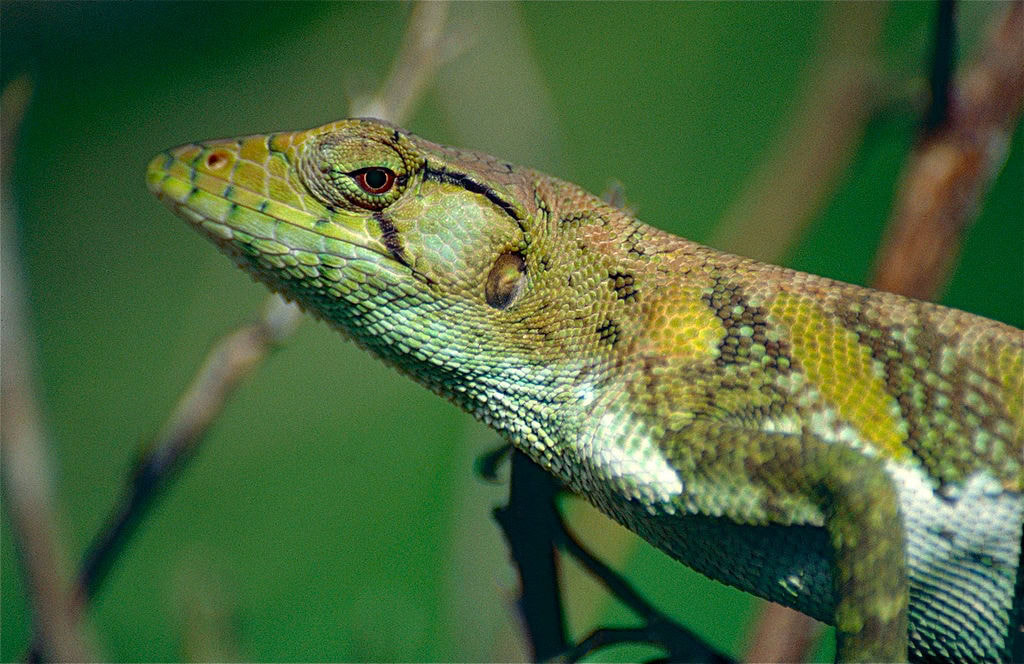
Health and Durability
Monkey Anoles are relatively hardy when provided with proper care, but they are sensitive to environmental changes and stress. Their health can decline quickly if their habitat is not maintained correctly.
Common Health Issues
- Dehydration: Caused by insufficient humidity or lack of access to water droplets.
- Respiratory Infections: Often a result of excessive humidity or poor ventilation.
- Metabolic Bone Disease: Caused by inadequate UVB lighting or improper supplementation.
- Stress-Related Issues: Frequent handling or sudden changes in their environment can lead to stress, which weakens their immune system.
Preventative Care
- Regular Monitoring: Check humidity, temperature, and lighting daily to ensure optimal conditions.
- Clean Environment: Keep the enclosure clean to prevent mold and bacterial growth.
- Veterinary Care: Schedule regular check-ups with a reptile-savvy veterinarian, especially for imported individuals who may have parasites.
Lifespan
With proper care, Monkey Anoles can live for 5–8 years. However, their lifespan may be shorter if they are wild-caught or not provided with ideal conditions.
Availability and Cost
Monkey Anoles are not as widely available as more common reptile pets. They are often sourced from specialty breeders or reptile expos, and captive-bred individuals are preferred over wild-caught ones.
Where to Buy
- Breeders: The best option for obtaining a healthy, captive-bred Monkey Anole.
- Reptile Expos: A great place to meet breeders and see a variety of lizards.
- Online Retailers: Some reputable online stores may offer Monkey Anoles, but ensure they are captive-bred.
Cost
- Initial Purchase: Prices typically range from $20 to $50 for standard individuals, with rare color morphs costing more.
- Setup Costs: Expect to spend $200 or more on a proper enclosure, lighting, and habitat accessories.
- Ongoing Costs: Budget for live insects, supplements, and replacement bulbs.
Pros and Cons
Pros
- Unique Appearance: Their vibrant colors and chameleon-like features make them a stunning display animal.
- Active Behavior: Their climbing and acrobatic skills are entertaining to watch.
- Moderate Size: They are small enough to fit in most homes but large enough to be easily observed.
Cons
- Skittish Nature: Not suitable for frequent handling or interaction.
- Specific Care Requirements: High humidity, UVB lighting, and a well-planted enclosure are essential.
- Sensitivity to Stress: Prone to health issues if their environment is not maintained properly.
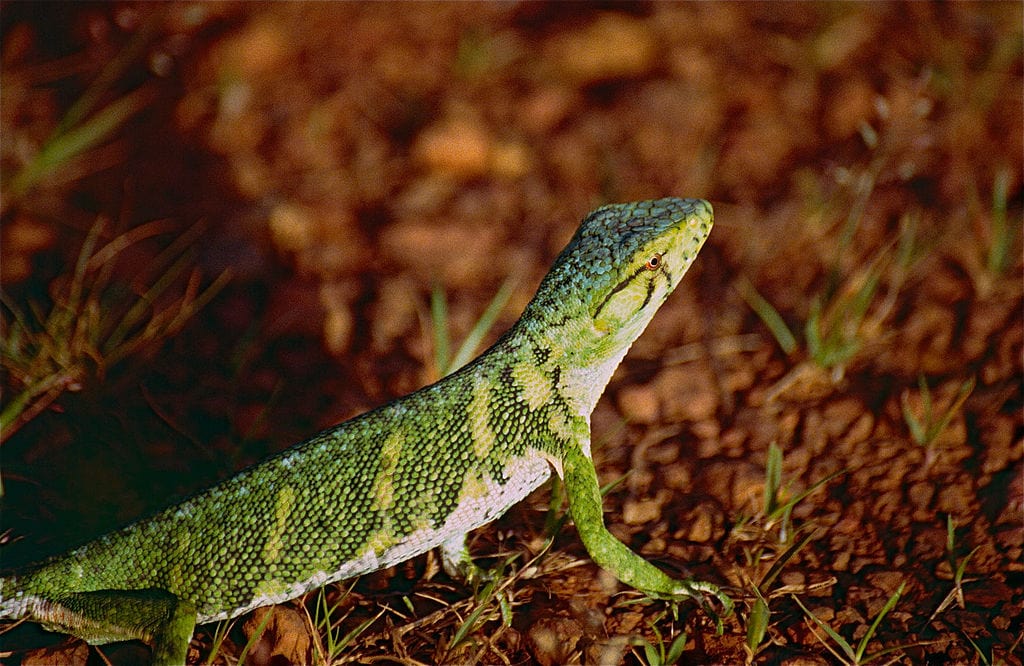
Final Thoughts
Monkey Anoles are a unique and rewarding pet for experienced reptile enthusiasts who enjoy creating naturalistic habitats and observing their pets’ behaviors. While they are not ideal for beginners or those looking for a hands-on pet, their beauty and active nature make them a captivating addition to the right home. If you’re considering a Monkey Anole, ensure you’re prepared to meet their specific care requirements and provide a stable, stress-free environment.
Have you owned or considered owning a Monkey Anole? Share your experiences and tips in the comments below!
For more reptile care tips and reviews, stay tuned to our blog and don’t forget to subscribe to our newsletter! 🦎



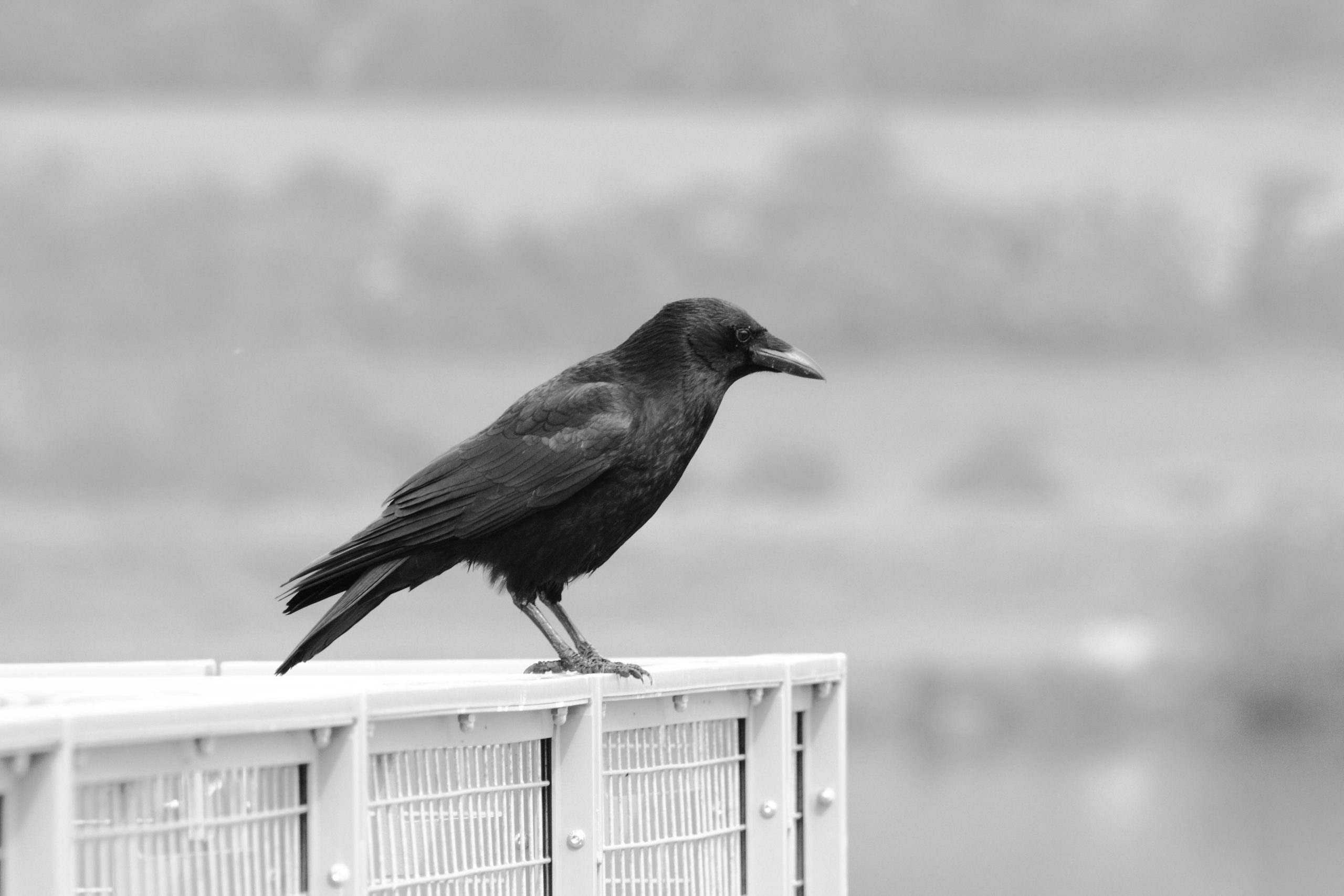
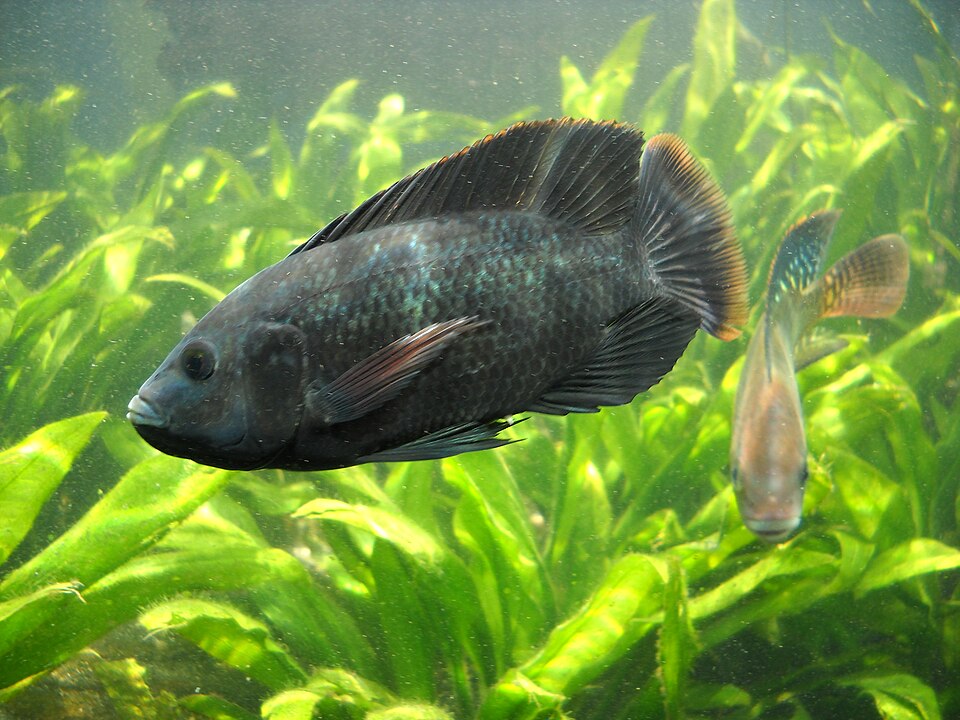
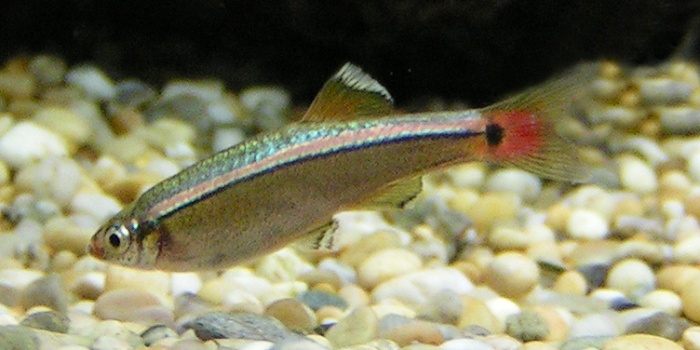
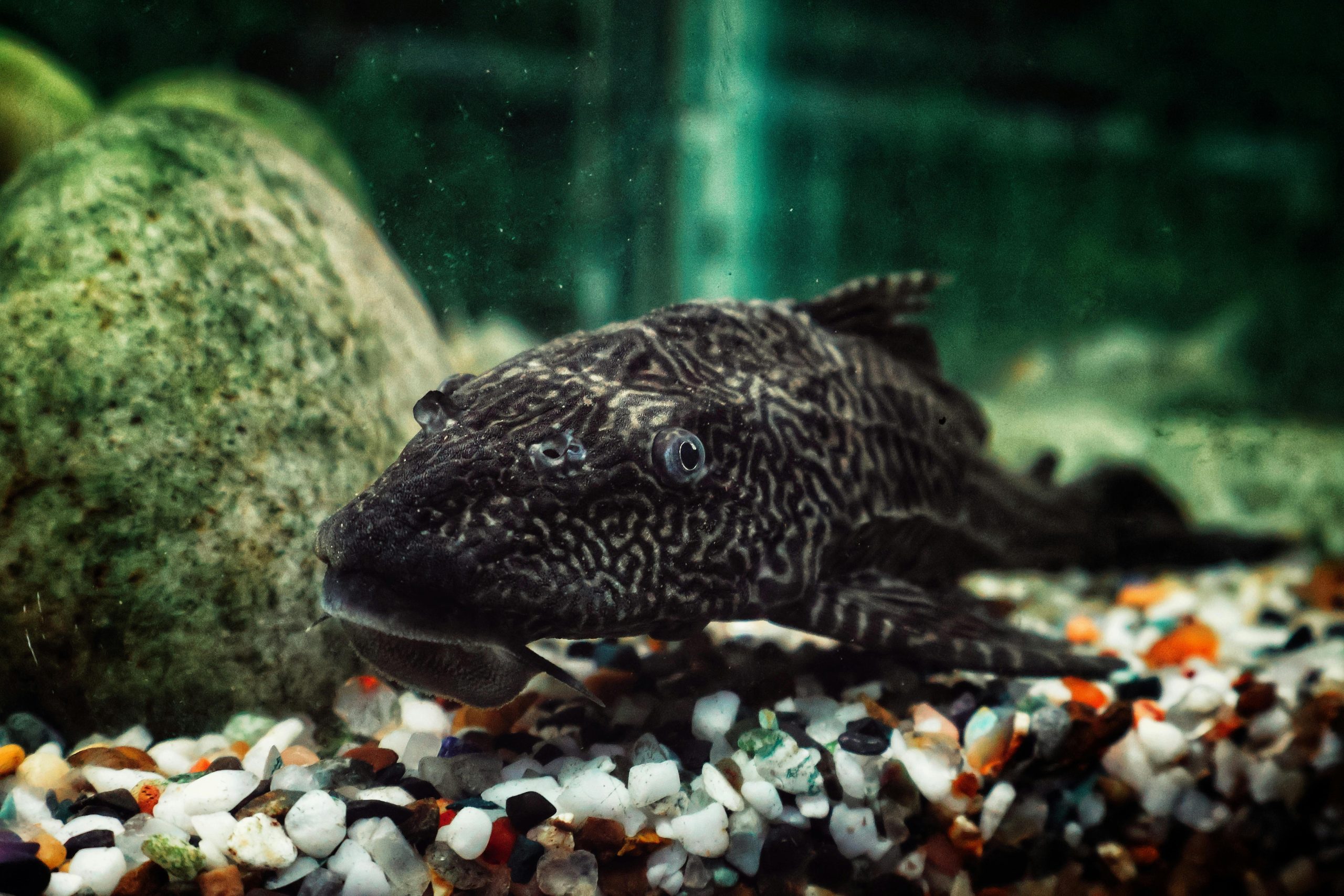
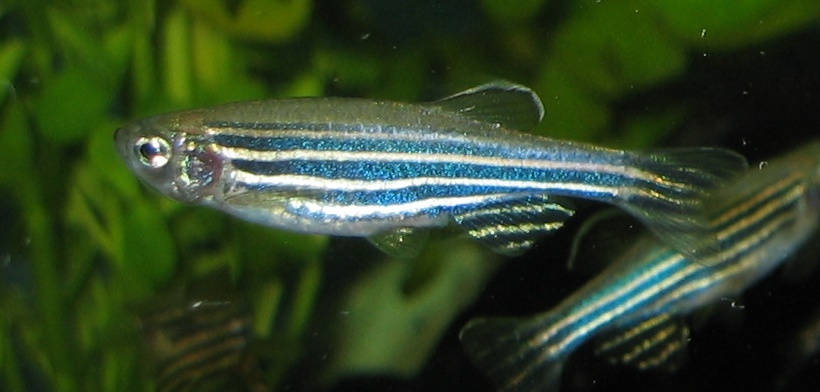
Leave a Reply